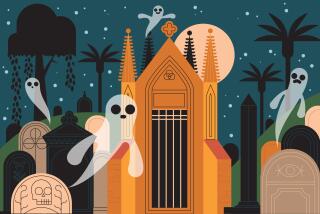The Long Goodby, Part II
It was a party meant for L.A. on a night as sweet as hot buttered rum.
There were actors and writers and television producers and writing students and writing teachers and God knows what else, gathered to honor another writer, this one dead.
For the record:
12:00 a.m. Oct. 14, 1988 Los Angeles Times Friday October 14, 1988 Home Edition Metro Part 2 Page 2 Column 5 Metro Desk 2 inches; 53 words Type of Material: Correction
As a part-time screenwriter, Al Martinez knows how tough it is to fight for credits on one’s work. But he never thought he’d see his name left off his new column in the Metro section, as it was Thursday. It was an oversight, his editors say.
Martinez vows that his name will be on the column Saturday. He says: “This is not a new game, like ‘Tanglecolumns: Guess who wrote this column?’ ”
I’m talking about Raymond Chandler, of course, creator of the private eye Philip Marlowe. This is the year of his resurrection.
Chandler set his stories in Los Angeles and as a result has achieved the position of post-mortem icon among the local literati and the semi-literati.
The party, set on a hillside overlooking the ocean, commemorated the 100th anniversary of his birth and might have been dismissible as simply another reason to dress up, except for the evening.
It was perfect.
Santa Ana winds blew down the mountain passes to the Pacific Palisades, hot and dry and disquieting, evoking the kind of mood Chandler himself wrote about----winds that “make your nerves jump and your skin itch.”
As sunset came, the sky was brushed with flaming reds, adding yet another level of surrealism to an already mystic evening. Headlights from bumper-to-bumper traffic hung a necklace of diamonds on the Pacific Coast Highway.
It was the kind of night that haunts dreams.
Even the house where the party was held, a white stucco building with bougainvillea cascading down a wall, was right.
So was the swimming pool and the yard and the white chairs we sat on to hear an amused Walter Matthau read from “The Big Sleep” and the 1940ish music that drifted out of speakers tucked in corners.
The men wore snap-brim hats and wide ties, and the women dug into history for dresses and suits that set them back 40 and 50 years, style-wise.
Then there was Bogie.
He was standing under a tree smoking a cigarette and looking over the crowd, as still as a statue and as haunting as organ music in an empty church.
For a minute I thought it was Bogart’s ghost and I was beginning to feel like the woman who saw Elvis in a Michigan supermarket.
I was wondering if I should mention this to somebody when a friend said, “I see you’ve spotted Sacchi.”
I had been staring at Bob Sacchi, who has built a career on being a Humphrey Bogart look-alike and was invited to the party for obvious reasons.
Sacchi starred in “The Man With Bogart’s Face” and bears a striking resemblance to the late tough guy actor who, incidentally, played Marlowe in “The Big Sleep.”
Sacchi not only looks like Bogart, he becomes Bogart in both voice and gesture and in the fleeting mannerisms that identify someone even when he’s standing still.
I asked Sacchi about this and while he admits that looking like Bogart has brought in good money for the last 20 years, there’s a Sacchi inside the Bogart yearning to get out.
“I’m an actor,” he said. “I do other things beside Bogie.”
Maybe so, but it didn’t matter that night. The face was what the evening was buying because the face fit so perfectly into what the evening was all about.
This was more than just another party. It symbolized what L.A. does best, dressing up and making believe and getting into the thing the way no other town in the world can.
I mean, this is Fantasyland, folks, and while that may get a little tiring sometimes, on nights like this it works.
The party was given by a group that calls itself the UCLA Friends of English and even that seemed somehow OK, though anything remotely associated with academia usually implies sessions of niggling self-aggrandizement.
It worked fine this time and added a touch of its own, sprinkling aspiring writers through the crowd. There’s nothing like white wine and aspiration to nail down a party.
But enough was enough, and I headed for the gate. As I did, I could see Sacchi standing in the shadows, not moving, watching.
An elderly lady saw me looking off in his direction and said, “Isn’t it amazing how much that man looks like Bogart?”
I leaned close to her and said, “What man?”
The sky colors were gone and the Santa Anas had died. The night tingled with mystery. A siren wailed along PCH and I couldn’t help but wonder if at that very moment someone might be . . . naw.
Even in L.A. they wouldn’t murder someone just for a party . . . would they?
More to Read
Sign up for Essential California
The most important California stories and recommendations in your inbox every morning.
You may occasionally receive promotional content from the Los Angeles Times.









